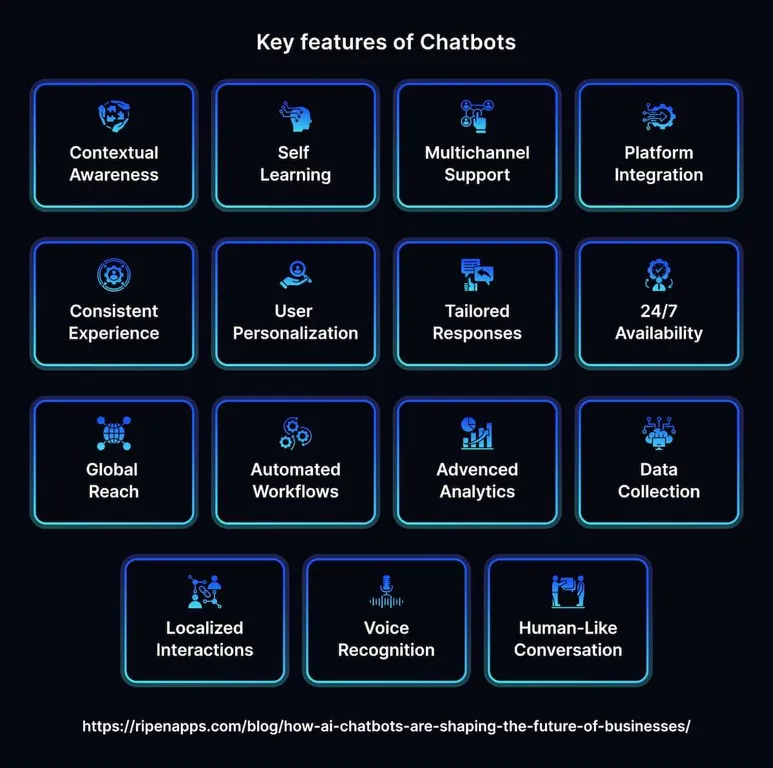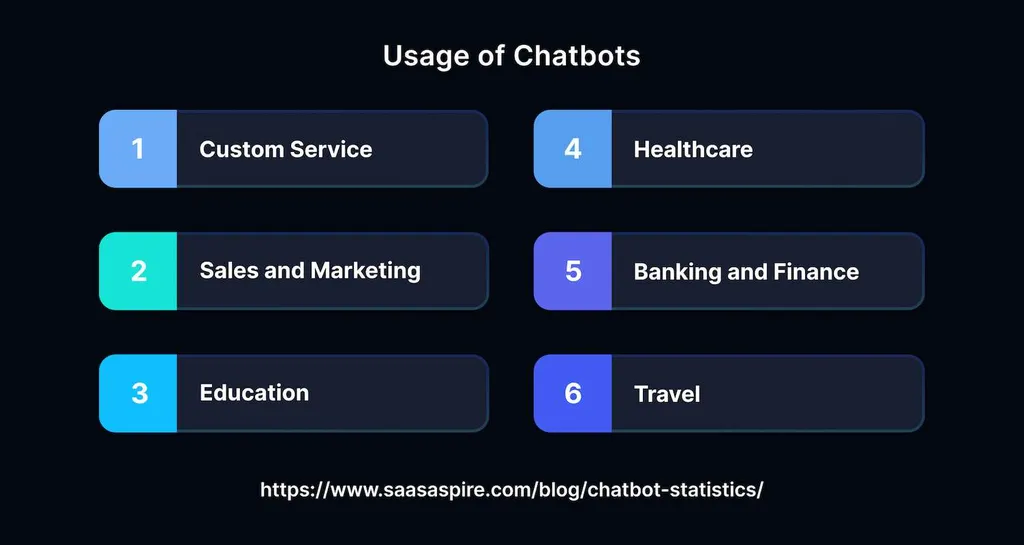Businesses integrate systems based on AI, ML, and other technologies to robotize tasks, diminish expenditure, and lower operational complexity. The deployment of algorithm-driven chatbots allows them to serve customers better and shorten the resolution time by providing timely responses to queries. In our blog post, we explore the future of chatbots and analyze the trends shaping healthcare, finance, and other niches. The fast-paced implementation of AI features across economic sectors helps companies recognize their potential. Ventures deploy these systems to increase the efficiency of procedures.
Why Are Chatbots Important for Modern Businesses?

Chatbots are automated software solutions designed to communicate with clients and resolve disputes without the need for human intervention. Future developments of such tools are associated with AI technology. In the coming years, virtual assistants will cope with more challenging tasks without human supervision. While they typically follow escalation guidelines when dealing with challenging queries, they will learn how to resolve challenges without external assistance.
Complex chatbots have an improved capacity to gauge emotions and suggest options that are likely to appeal to a particular buyer. The implementation of NLP technology makes conversations with a bot more enjoyable.
The utilization of AI bots in eCommerce is forecasted to expand broadly. The future of AI chatbots is promising. Such tools let businesses increase sales, provide custom tips, and offer reliable support services to facilitate order completion. As more businesses conduct their operations online, they utilize bots to streamline payments via convenient gateways.
Future Developments of Chatbots
Even though the impact of AI technology is indisputable across all markets, companies should be aware of its potential shortcomings and implement innovative products that meet regulatory requirements. Those who learn how to capitalize on the potential of AI can solidify their market presence and increase profits manifold. Let’s explore the most notable chatbot future trends that help firms strengthen relationships with clientele and foster trust to expand outreach.
- Deep personalization: Bots based on complicated algorithms analyze past interactions to make communication experiences more engaging. They consider data about buyers’ preferences, behaviors, and needs to offer relevant recommendations. This allows them to enhance their search capabilities and simplify finding a suitable item in a large catalog. The chatbots developed by professionals can recommend products that meet client’s requirements and are within their budgets. Such well-trained chatbots will assist consumers with choosing travel destinations and devising unique experiences.
- A capacity to interpret emotions: Bots will further improve their capacity to detect human emotional states. They recognize even subtle shifts in moods and proactively solve any problems that may arise. The usage of sentiment analysis empowers them to connect with buyers or patients on a deeper level. In healthcare apps, chatbots choose a more empathetic tone of voice and offer encouragement. Such tools gain traction in education, enabling students to study in a supportive environment.
- AI-powered analytics: LLM-based apps provide important insights helping ventures to understand the needs of their target audiences based on the available feedback and improve their offerings.
- Better decision-making: Based on in-depth market research, firms manage and train employees effectively, monitor staff engagement levels, and optimize internal processes. It empowers them to make result-yielding decisions and achieve higher satisfaction.
Chatbots address convoluted issues without escalating them. In healthcare, they monitor the state of patients suffering from chronic conditions and send notifications to healthcare providers. In finance, they handle refunds, change account settings per user requests, and troubleshoot technical bugs.
The Functionality of Advanced Chatbots

By integrating algorithm-based virtual helpers with existing customer support systems, companies get an edge over competitors and increase the accessibility of services. Below, we have outlined the main modern advancements related to the development and implementation of chatbot artificial intelligence solutions that are likely to shape the future of this technology.
Thanks to the advancement of natural language processing (NLP) tools, firms now build CS bots capable of understanding the nuances of queries. Such technology interprets text and provides context-relevant replies.
The development of the first no-code platforms signified a pivotal shift in building LLM-driven automated messengers. Nowadays, even companies without in-staff members who have extensive coding backgrounds can build complex conversational agents with ease and teach them to perform specific tasks. Such services are designed to perform a variety of tasks with ease. Below, we have listed their main functionalities.
Access to large volumes of data
The development of the GPT-3 machine learning (ML) model now allows ventures to build AI tools that understand a query in a specific context. Individuals no longer need to sum up their past conversations whenever they contact a brand, as companies use large language models (LLMs) trained on a huge amount of data, which allows them to improvise, remember communication with people across multiple channels, and provide quick replies to increase the overall satisfaction levels.
Social media monitoring
Maintaining a spotless reputation necessitates using advanced sentiment analysis tools. Building lasting client relationships requires addressing problems that may potentially damage a brand’s image. NLP-based tools can be trained to detect negative reviews and engage in communication with consumers to decrease their dissatisfaction.
The future of chatbots lies in their ability to not only address consumer concerns but also proactively improve brand reputation. Deploying AI-powered tools to monitor social networks helps businesses understand what strategies to use to improve their online presence and adjust marketing efforts. Fixing the fake news troubles also helps well-devised NLP products filter and counter disinformation. By analyzing the web, AI bots collect data about buyer preferences, which allows them to engage consumers in meaningful dialogs.
Advanced voice assistance
Thanks to the development of voice recognition technology, AI bots can communicate with customers via phone, messengers, and videoconferencing tools. The usage of voice helpers was destined to become omnipresent due to the solutions implemented by Google and Amazon.
Major enterprises decided to capitalize on this trend and implement voice bots that let individuals discover the information they are interested in, prevent payment and shipping delays, clarify questions, and complete purchases. Further integration of such assistants with smart home devices facilitates controlling home appliances, answering calls, getting updates and notifications, and performing other tasks.
Complex dialogue management
Modern conversational products support nuanced multi-turn conversations, which allows consumers to feel as if they are communicating with human agents. They recognize emotions and perceive frustration and dissatisfaction. It enables them to adjust their responses and make personalized offerings. Their capacity to put every question in the wider context helps them maintain human-sounding conversations and react to unexpected turns.
The Impact of Chatbots on Business Landscape
Online helpers enable ventures and organizations of all sizes to enhance the quality of their interactions with clients. The implementation of algorithm-powered tools facilitates improving the accessibility of offerings and enables enterprises to serve customers better. The future of chatbots promises even greater advancements, allowing businesses to provide more personalized and efficient customer experiences. Let’s explore the main benefits of interactive assistants:
- Healthcare: Hospitals and other organizations utilize them to communicate with clients in multiple languages, schedule appointments, and solve payment issues. Maintaining transparency and fostering accountability allows organizations to build trust and expand their outreach, serving patients from different backgrounds. As the sector continues to grow, chatbot deployment will become instrumental in generating more value and maintaining a personalized approach to serving clients.
- Tourism: Agencies offering hospitality services rely on digital helpers to expedite check-ins and make reservations intuitive. As 25% of firms deploy bots and 40% of individuals find them highly efficient, businesses will deploy them to optimize travel arrangements.
- Finance: Banks and other organizations may significantly benefit from digitized procedures. MetaDialog creates powerful interactive assistants to boost CS team productivity by 5 times and lower the average resolution time to 20 seconds. The usage of such tools ensures clients will solve their queries without delays, which will result in higher satisfaction.
- Staff management: Optimizing recruitment processes empowers ventures to save money and robotize basic procedures. Bots browse through the resumes and select the most suitable candidates, they streamline onboarding and function as complex help desks. However, enterprises should deploy high-quality datasets to train LLMs to eliminate biases. Seasoned developers build custom LLMs that allow chatbots to increase the response speed by two times and maintain regulatory compliance.
- Retail and eCommerce: Automated systems improve engagement, provide helpful recommendations, streamline order tracking, and enhance shopping experiences. According to statistics, 80% of businesses in the sector have already deployed such solutions or plan to integrate them soon.
These advancements demonstrate the adoption of LLM solutions across main industries is predicted to increase. Businesses discover new applications and capitalize on innovations to establish a competitive advantage.
Summing Up
As this detailed analysis shows, the future of chatbots across various industries depends on ventures’ ability to leverage such tools to automate operations and achieve sustainable growth. However, many enterprises do not have dedicated professionals with extensive backgrounds to implement such solutions. Building powerful LLMs from scratch requires significant resources. This is why many businesses outsource this task to experienced service providers such as MetaDialog to save money and integrate innovative digital products with their legacy systems without investing in infrastructure. Contact our experts today and discover how to deploy LLM-powered systems to enhance interactions, boost satisfaction, and automate routine processes.
